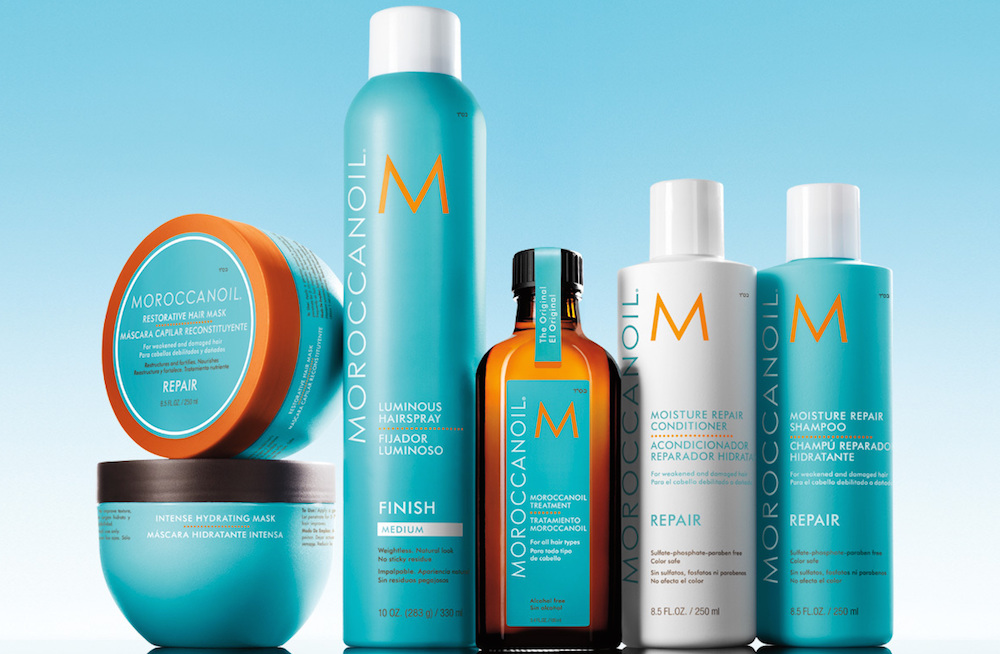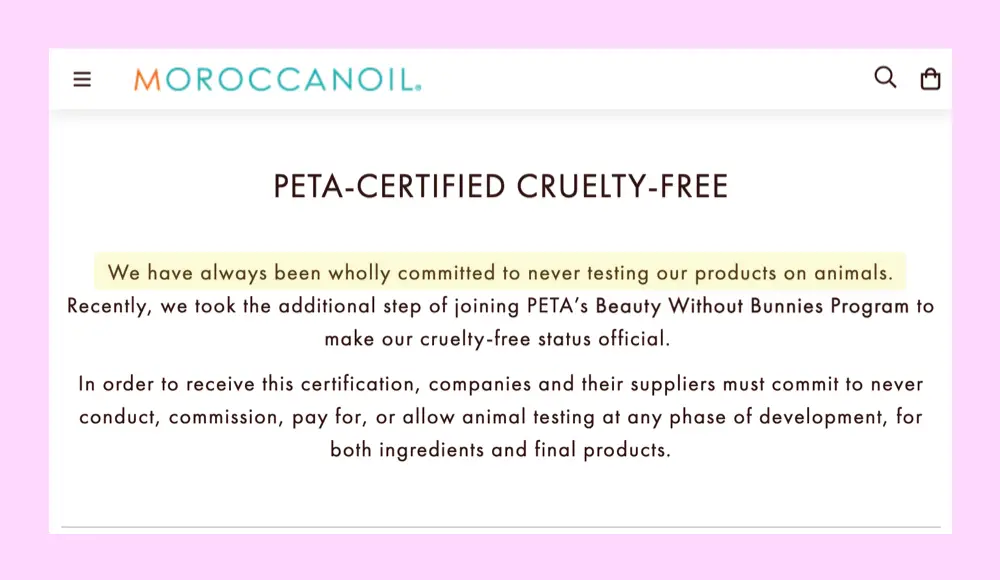Moroccanoil is one of the few brands that truly did change the face of the beauty industry. Its little known signature ingredient is inimitable in the industry but is the luxurious Moroccanoil cruelty-free and vegan?
Moroccanoil is cruelty-free. It doesn't conduct animal testing on its products nor does it distribute its cosmetics where animal testing is required by law. Moroccanoil is not considered a vegan brand.
Raise your hand if you only heard about argan oil after Moroccanoil became widely popular?
Yeah, us too.
For centuries this now commonplace ingredient was only common knowledge to the Berber people of Morocco before a happy accident.
Founder and entrepreneur Carmen Tal had a terrible hair experience while traveling, but an application of Argan Oil revived her locks completely.
Tal’s new mission was to bring this magical oil and its benefits to women across the globe. That happened in 2007. Now Moroccanoil has an entire line of hair and body care products.
It’s been a decade since Moroccanoil launched its signature treatment oil and found worldwide success. What are its cruelty-free and vegan policies?
Is Moroccanoil Cruelty-Free and Vegan?
Moroccanoil is 100% Cruelty-Free
It does not:
Moroccanoil is proudly cruelty-free as a member of PETA’s Beauty Without Bunnies programs.
A good start but not the best internationally recognized certification to guarantee a brand is cruelty-free.
The brand is also privately owned, with no known association with animal testing.
This brings us to our next point:
Moroccanoil is Not Vegan
Although Moroccanoil has several vegan products – it does not consider itself vegan.
Why?
The brand states that it cannot call itself vegan because traces of dairy or egg could be found in its formulas.
We’ll give them 10 points for honesty!
Some of the most common animal-derived ingredients Moroccanoil uses include:
If you're interested in finding vegan brand alternatives – keep reading or click on this link: Moroccanoil vegan alternatives.
Animal Testing Policy and History
Moroccanoil is committed to creating effective and luxurious hair treatments that are also cruelty-free. This has been its goal since launching.
Cruelty-Free Status in 2022
Here is a screenshot of Moroccanoil official statement regarding its cruelty-free policies and vegan products, taken from its website:
Certification
Moroccanoil is PETA certified, which is not a bad start.
However, it would be nice to see more certification since it’s so proudly cruelty-free.
While you might know PETA very well – it surprisingly doesn't hold the strictest cruelty-free regulations. It seems only to require a brand's written consent that abides by the PETA code of conduct.
Certification from Leaping Bunny is ideal because it holds rigorous standards and does regular audits to ensure they are upheld.
The Leaping Bunny association is very strict and reliable, which ensures that:
If you see a bunny stamp on the back of your product bottle – that's an excellent sign. But don't let the image itself fool you. A lot of brands are using fake logos to deceive consumers.
Do your homework and see which products are genuinely cruelty-free first. This article will help you: Which Cruelty-Free Logos Can You Trust?
Is Moroccanoil Sold Where Animal Testing is Required By Law?
Moccoranoil does not distribute any of its products in brick-and-mortar stores in China or any country that requires animal testing on cosmetics by law.
China has a shocking track record. It is the country with the most animal testing globally, with over 20 million animals used per year.
However, if you live in China or are concerned about its cruel beauty policies, there are a couple of loopholes.
Here's how to find cruelty-free cosmetics in China: Are Cosmetics Made in China Cruelty-Free?
What Moroccanoil Products Are Vegan?
So here’s the thing…
Even if a Moroccanoil product may be free of animal-derived ingredients, it could still contain trace amounts of dairy or egg.
So the brand claims that none of its products can technically be considered vegan.
For interest sake, here are five of its most popular products that are free of animal-derived ingredients in its core formula:
Vegan Alternatives to Moroccanoil
Moroccanoil is extremely transparent when it comes to why they don’t consider their product range to be vegan.
Even though the formulas don’t include animal-based ingredients, the risk of egg or dairy coming into contact with vegan customers is one they won’t take.
Luckily, there are many alternatives you can find that are certified cruelty-free and vegan to choose from.
Here are some nature-inspired haircare brands within the same price range that are 100% vegan and cruelty-free.
Is Moroccanoil Natural and Organic?
Moroccanoil may use the natural benefits of its signature ingredient, argan oil. But, it isn’t considered natural or organic.
It does claim to use safe, simple, and clean ingredients.
Its whole ethos is to make clean formulas and products that anyone can use, no matter their type or styling preference.
Clean vs. Natural Ingredients
The term "natural" is not regulated for cosmetics and skincare. In other words, it doesn't hold one specific meaning.
Usually, it means a product is free of certain more toxic synthetic ingredients, including parabens, phthalates, sulfates, and more. But people also interpret "natural" to mean ingredients of immediate plant origin.
Here's the thing: "natural" is not necessarily good. Just because an ingredient is natural (take egg whites, for example) doesn't mean you should rub it on your skin and risk a salmonella infection!
All products use a certain amount of synthetic ingredients in their formulas. Moroccanoil is no exception – but it does choose to use better or clean synthetics.
If a synthetic ingredient is "clean," it means it is safe and non-toxic for us. Its purpose is to preserve the stability of a beauty formulation.
A few naturally-derived ingredients Moroccanoil uses to enhance its hair care include:
Does Moroccanoil Use Safe Ingredients?
According to Skin Safe, Moroccanoil has an average 82 - 91% allergen-free ranking across 85 products.
All Moroccanoil products are sulfate-free, phosphate-free, and paraben-free. The brand also avoids allergens such as common preservatives, gluten, lanolin, coconut, MCI/MI, nickel, Propylene, glycol, soy, and irritants.
Reading the ingredient list is crucial because Moroccanoil is not 100% hypoallergenic or non-comedogenic, and they do not claim to be.
However, certain products are specifically for these concerns, so make sure you buy what your skin needs.
The EU/UK Have Stricter Ingredient Regulations
We don’t want to scare you, but you HAVE to read up on any product’s ingredient list before you make a purchase – especially if you live within the United States. The reason why will shock you.
The FDA has only banned or restricted 11 harmful chemicals from cosmetics within the country. Europe and the UK, on the other hand, have banned 1,328!
Moroccanoil seems fairly safe but always good to know which things to look for when you scan through an ingredients list.
With haircare and personal care products, you want to avoid these ingredients:
Are Cruelty-Free Ingredients Safe?
If you’re worried about how safe it is to use cosmetics not tested on animals – please relax and take a sigh of relief.
There is no reason why cruelty-free products shouldn’t be as safe as anything tested on animals.
Not only is it easy to test ingredients without using animals altogether, but there are so many pre-approved ingredients you can use to make cosmetics that there is no need.
If you’re interested, here’s more on the subject: Are Cruelty-Free Cosmetics Safe?
Is Moroccanoil Sustainable and Ethical?
Moroccanoil has some strong sustainability and ethical initiatives as it ties in with the company values.
Some of the ethical causes Moroccan Oil supports include:
It's no secret that the world has a huge waste problem, and cosmetic brands only make it worse by using unsustainable packaging and harmful ingredients.
Some of the ways Moroccan Oil is taking strong environmental accountability is by:
We think Moroccan Oil has made a good start to its sustainability efforts. Could they do more?
Yes- here are our suggestions:
Final Thoughts
Moroccanoil is a well-developed haircare brand that takes various ethical factors into consideration. The fact that they are cruelty-free is a step towards a more sustainable future in the beauty industry.
We appreciate that it has a transparent supply chain and is open to the public about its testing, purchasing, and distribution policies.
Of course, since Moroccanoil does not offer anything genuinely vegan – it might not be the best choice if you follow a vegan lifestyle.
Especially since the brand also uses mica and palm oil as an ingredient. (And it doesn’t confirm whether either ingredient is sustainably sourced.)
It would also be nice to see further cruelty-free accreditation from other reputable organizations.
So if you love this brand but want an improved cruelty-free and vegan policy – reach out to them!
They’re bound to listen if enough of us step forward!


